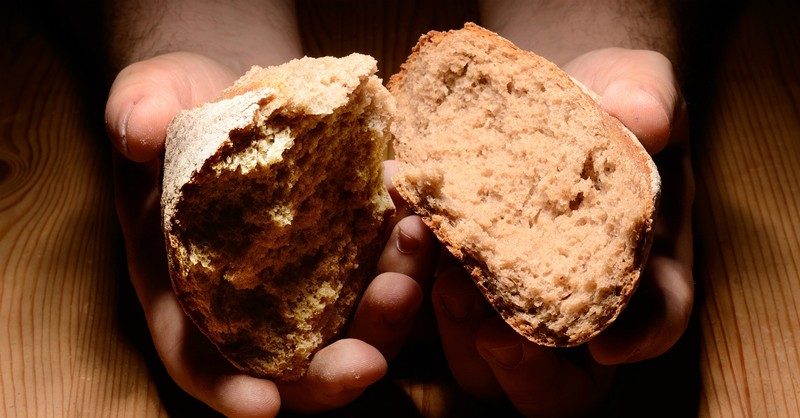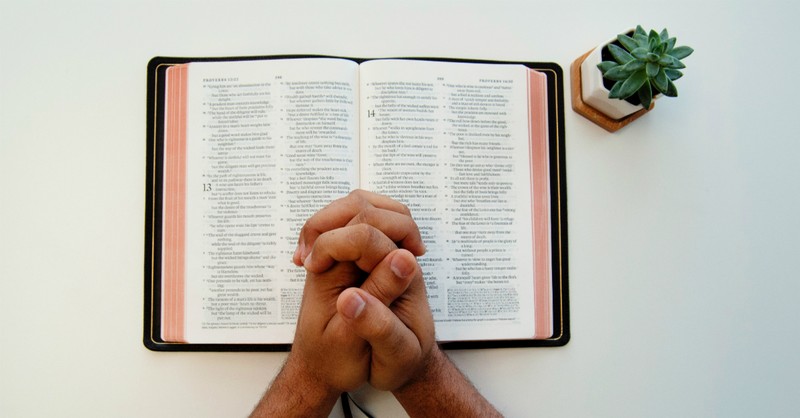
The Book of Psalms is one of the books of poetry and songs in the Old Testament. Many of them are attributed to David, but other writers include members of his court, King Lemuel, and several anonymous song writers and temple workers. Many readers find encouragement and comfort in the verses, and many have become some of the most well-memorized.
One such verse is Psalm 107:1, “Oh give thanks to the Lord, for he is good, for his steadfast love endures forever!”
David wrote this hymn of praise and thanksgiving, which focuses on God’s unwavering love and patience with sinners. Psalm 107 is a reminder to thank God for that mercy, because it will last eternally. The Lord waits patiently, forgiving those who come to Him, turning from their sin and asking for forgiveness, and for that He deserves the praise of thanksgiving.
To help you in thanking God, we created a 30 Days of Gratitude Prayer Guide HERE. Download and print this guide to keep with you as a reminder of God's love and promises.
Photo credit: Pexels/Andre Furtado

What Does "Give Thanks to the Lord" Really Mean and Look Like?
This particular verse is the beginning of Psalm 107. David emphasizes the point of His song by starting with the command to give thanks. The following verses call on those who have salvation from the Lord to let the world know, tying the call to give thanks with a state of redemption; “Let the redeemed of the Lord say so, whom he has redeemed from trouble” (Psalm 107:2).
David proceeds to list different kinds of sinners who have become the redeemed of the Lord. A recurring refrain in this Psalm is, “Let them thank the Lord for his steadfast love, for his wondrous works to the children of man!” (This statement occurs four times.)
David opened the Psalm with a call to action and then explains why the Lord deserves this praise. This list of specific kinds of sinners the Lord redeemed marks this Psalm as somewhat different from other Davidic Psalms. Even personal ones historically accepted to be about his sin with Bathsheeba, such as Psalm 51, do not list the explicit sin.
Some of the redeemed called to give thanks include:
“Some wandered in desert wastes, finding no way to a city to dwell in; hungry and thirsty, their soul fainted within them” (Psalm 107:4-5).
“Some sat in darkness and in the shadow of death, prisoners in affliction and in irons, for they had rebelled against the words of God, and spurned the counsel of the Most High” (Psalm 107:10-11).
“Some were fools through their sinful ways, and because of their iniquities suffered affliction; they loathed any kind of food, and they drew near to the gates of death” (Psalm 107:17-18).
“Some went down to the sea in ships, doing business on the great waters; they saw the deeds of the Lord, his wondrous works in the deep” (Psalm 107:23-24).
In David’s time, there were many ways to give thanks to God, which is true today. There were Psalms of thanks and praise, like this one. Such songs of praise are common in the Bible and are easily accessible today. In fact, songs of praise are raised more than any other specific type of praise.
Photo credit: Pexels/Cotton Bro

What Does the Bible Teach Us About Giving Thanks?
David leads songs of praise, as does Nehemiah, and Ezra, among many others. Prayer is another common and key way to give thanksgiving to the Lord. An important element of giving thanksgiving to God, in song or otherwise, is to credit Him for the good He does, and for His holy nature. In the Old Testament, Daniel shines as an example of someone who prayed this way, “To you, O God of my fathers, I give thanks and praise, for you have given me wisdom and might, and have now made known to me what we asked of you, for you have made known to us the king's matter” (Daniel 2:23). The prophet gave God the glory, thanking Him for revealing the meaning of the Babylonian king’s dream. In private and in public, God received the due credit for His mercies.
One way the Jewish people gave thanks that no longer applies to Christians today in the same way, was the sacrifice of thanksgiving in the Temple.
“And this is the law of the sacrifice of peace offerings that one may offer to the Lord. If he offers it for a thanksgiving, then he shall offer with the thanksgiving sacrifice unleavened loaves mixed with oil, unleavened wafers smeared with oil, and loaves of fine flour well mixed with oil. With the sacrifice of his peace offerings for thanksgiving he shall bring his offering with loaves of leavened bread” (Leviticus 7:11-13).
Believers who wanted to give thanks to God brought unleavened bread as a thanks offering, and it was called a freewill offering. For the offering to be authentic and pleasing to the Lord, it had to be given without prompting, on the volition of the giver. Unlike some of the other sacrifices in Leviticus, the offering of thanksgiving was not on a set schedule. It was a genuine expression of gratitude.
A modern comparison can be found in the church, with the concept of giving the tithe, or one’s time or talents, out of sincere gratitude as a way to worship God.
Photo credit: ©Getty Images/Thomas Soellner

Who Is David Telling to "Give Thanks"?
In Psalm 107, David calls upon the people of Israel to worship the Lord, and to thank Him for His patience and mercy with them. In the verses, David not only invokes the sins of individuals, but also the trials and tribulations of the nation itself.
An allusion to some of these difficulties include “Then they cried to the Lord in their trouble, and he delivered them from their distress. He brought them out of darkness and the shadow of death, and burst their bonds apart” (Psalm 107:13-14).
The Lord delivered the Hebrews from bondage in Egypt, and would redeem them from bondage in the future. The Psalmist calls on his audience to thank the God who had redeemed them in the past, and would do so in the future.
Where Else Does the Bible Talk about Giving Thanks to the Lord?
While thankfulness is a theme throughout the Bible, there are places that place a heavier emphasis on it. Throughout the books of 1 and 2 Chronicles, kings and prophets of Israel thank God for protecting or rescuing Israel. It is a common subject in the Psalms. Many of the prophets cried out in thanksgiving and encouraged others to do the same.
The writers of the New Testament reinforced the importance of giving thanks as well. Some verses about thanksgiving include:
“The one who observes the day, observes it in honor of the Lord. The one who eats, eats in honor of the Lord, since he gives thanks to God, while the one who abstains, abstains in honor of the Lord and gives thanks to God” (Romans 14:6).
“I give thanks to my God always for you because of the grace of God that was given you in Christ Jesus” (1 Corinthians 1:4).
“Give thanks in all circumstances; for this is the will of God in Christ Jesus for you” (1 Thessalonians 5:18).
In these verses, the Bible encourages believers to give thanks in all circumstances, for fellow believers, and when thinking about God. He loves His people and blesses them in many ways.
One important moment where the Lord Jesus gave thanks, and encouraged His believers to copy Him, was at the Lord’s Supper. When He instituted this practice Matthew recorded, “And he took a cup, and when he had given thanks he gave it to them, saying, “Drink of it, all of you, for this is my blood of the covenant, which is poured out for many for the forgiveness of sins” (Matthew 26:27-28).
Part of having a relationship with someone is thanking them for what they do, and it is no different having a relationship with Jesus Christ. Part of the Lord’s Supper is remembering the sacrifice of Jesus on the cross, and believers should thank Him for it when taking time to meditate on this great act of love.
Photo credit: ©Sparrowstock

How Do We Know That God Is Deserving of Thanks?
Sometimes when life gets difficult, it is difficult to see God’s goodness. The Bible is full of reminders of everything He does, for which believers should thank Him. He created each person, imbuing that individual with a soul, reason, and a will, as explained in Genesis and the Psalms. He takes care of the daily needs of all living creatures, a point that Jesus touched on in His teachings (Matthew 6:25-32).
God loves humanity, constantly seeking to have a relationship with each person. Despite the sins of man, God still wanted that relationship, and so He sent His Son Jesus Christ to die as a substitute, taking on the sins of the world so people could be reconciled with Himself.
When someone does something nice, it is polite to thank that person. God gave us everything we have, and then saved us from our sins! He redeemed sinful man, and whoever calls in the name of the Lord can be saved forever. These are the big things He has done for everyone, and He does so much more on a daily business. Just like Psalm 107 reminds the reader, God is patient with people when they sin, when they turn away, and when they are disobedient. He deserves thanks for that patience.
How Do We Give Thanks to God?
Thanking God does not have to be complicated. Just like saying “thank you” to a person for a kindness is simple, but effective, giving thanks to God can be a short prayer of gratitude. Just like David put out creative talents to write songs of thankfulness, everyone has a talent they can use to express their love.
Singing and worshipping, prayer, and acknowledging God’s goodness are some wonderful ways to give thanks to the Creator, the Savior, and Friend.
Giving thanks should be a daily part of the Christian life because God does things every day that are deserving of that thanks.
A Prayer to Give Thanks to the Lord
Lord, teach me to offer you a heart of thanksgiving and praise in all my daily experiences of life. Teach me to be joyful always, to pray continually and to give thanks in all my circumstances. I accept them as Your will for my life (1 Thessalonians 5:16-18). I long to bring pleasure to Your heart daily. Break the power of the enemy in my life. Defeat Him through my sacrifice of praise. Change my outlook and attitude into one of joyful contentment with my present circumstances. I thank You for… [Name a difficult circumstance in your life presently and thank God for it.]
Jesus, I want to be like You who obeyed the Father without complaint. You embraced the chains of humanity when You walked this earth. Convict me whenever I complain or compare myself with others. Give me Your attitude of humility and thankful acceptance. I want to be like the Apostle Paul who learned contentment in every circumstance. I choose to continually offer You a sacrifice of praise, the fruit of lips that give praise to Your name (Hebrews 13:15). I long to bring a smile to Your face. Teach me the power of a thankful heart. I know that Your truth dwells in a thankful heart.
“I will give thanks to the LORD because of His righteousness and will sing praise to the name of the LORD Most High. O LORD, our Lord, how majestic is your name in all the earth! You have set your glory above the heavens” (Psalm 7:17-18:1). In Jesus’ name, amen. (Debbie Przybylski)
Sources
Davenport, Jim. An Attitude of Thankfulness. Self-Published, 2014.
Wilmington, H.L. Wilmington’s Guide to the Bible. Wheaton: Tyndale House Publishers, 1981.
Photo credit: Pexels/Katii Bishop
Originally published Thursday, 21 October 2021.








